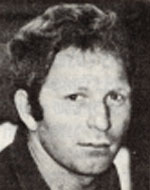Binyamin (Chopa), son of Chava and Eliahu, was born on May 2, 1938, in Ostrow Mazowieck, Poland, and immigrated to Israel with his mother and brother in 1951, after wandering extensively in Europe. “After his mother died he wandered and worked in several kibbutzim until he came to Kibbutz Nachsholim and joined the” Gal-Oz “nucleus, where he worked in the fishing industry and dedicated many hours of intensive work to this kibbutz. Benjamin, who was called “Chupa,” was drafted into the IDF at the end of November 1956. After basic training, he took a parachute course, a sabotage course, and a weapons training course. He was later assigned to an armored unit. He was trained in an armored unit, and was a good and dedicated soldier who performed all of his duties in the army. He was loved by all his friends and commanders, and friends said about him that he had helped them as much as he could, and did much to raise their spirits and make it easier for them, when he was asked, he performed every task he was given seriously. He returned to Kibbutz Nachsholim and worked in the fishing industry, and Chupa wanted to serve on the ships of the kibbutz, and after two years on the sea, “And returned to the kibbutz ships again. On the ship he met Hadas, who worked as the head of the “household”. After their marriage they made a trip to Europe and when they returned they established their home in Beit Hashita. The sea pulled him back, either because his soul had not “withered” from the wanderings he had had in his childhood, or because he wanted to find relaxation in the great sea and its expenses. Throughout his life, Benjamin rarely talked about the years of hardship he had endured in Europe. In all his actions, he wanted to forget about his difficult past. With great stubbornness, accustomed to her out of necessity, he sought to rehabilitate his life. In the “metal factory” in Beit Hashita he found interest and satisfaction. He had great vitality and a sensitive sense of distinction. Mistakes or omissions in various fields – in education, in society and in work – were very painful for him, and he would warn them about his clear, independent and clear position. He was a kind and loving man. He could distinguish between good and evil, justice and injustice, selfishness and generosity. He was a cheerful man, a lover of society and recreation, dancing and hiking, enjoying everything he had done and was always happy with what he had. He loved helping others. Chupa was a devoted father and a loving and indulgent husband. He invested a lot for his children, so that they would not miss anything, just as he had been missing in his childhood. After the war he was awarded the “Six Day War”. When the Yom Kippur War broke out, Benjamin was drafted and sent with his unit to the front in the Golan Heights to take part in stopping the Syrian attacks near Kuneitra. On October 10, 1973, when the unit was assembled in a parking lot east of Mount Yosifon, the site was shelled with Katyusha rockets. He was hit directly and killed instantly. He was brought to eternal rest in the Beit Hashita cemetery. He left behind a wife, a son, two daughters, and a brother. After his fall, he was promoted to sergeant. His kibbutz published a pamphlet in his memory, which included things about his character, about the days when he reached the tributaries and became a sailor, about his house he built in the kibbutz and about his days in service of the army. In another pamphlet called “Pnei Chaveri,” Kibbutz Beit Hashita devoted a few words to the memory of his sons who fell in the Yom Kippur War and Chopa among them. It was written about Chopa: “The multi-rooted tree that was planted in our landscape, and was absorbed – as one of us, and thus cut off – as one of us.” “Haaretz Shelanu” published a story and a list of “Chopa fell so as not to kick his children.”
